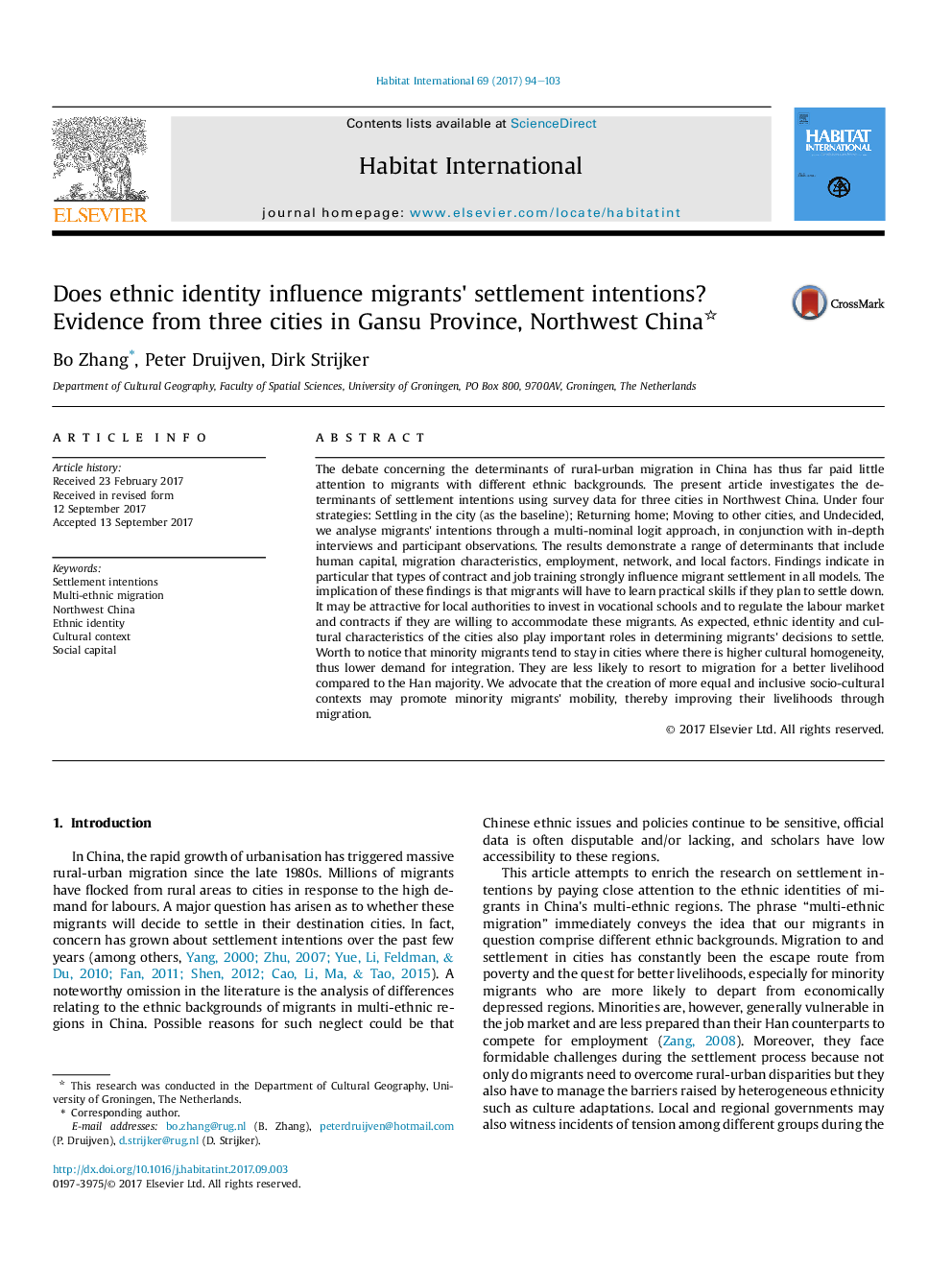| کد مقاله | کد نشریه | سال انتشار | مقاله انگلیسی | نسخه تمام متن |
|---|---|---|---|---|
| 5114599 | 1484475 | 2017 | 10 صفحه PDF | دانلود رایگان |
عنوان انگلیسی مقاله ISI
Does ethnic identity influence migrants' settlement intentions? Evidence from three cities in Gansu Province, Northwest China
ترجمه فارسی عنوان
آیا هویت قومی مؤثر است؟ شواهد از سه شهر در استان گانسو، شمال غربی چین
دانلود مقاله + سفارش ترجمه
دانلود مقاله ISI انگلیسی
رایگان برای ایرانیان
کلمات کلیدی
قصد حل و فصل، مهاجرت چند قومی، شمال غربی چین، هویت قومی، زمینه فرهنگی، سرمایه اجتماعی،
ترجمه چکیده
بحث در مورد عوامل تعیین کننده مهاجرت روستایی-شهری در چین تا کنون توجه کمتری به مهاجران با سابقه قومی مختلف داشته است. در این مقاله، عوامل مؤثر بر اهداف برنامه ریزی، با استفاده از داده های سنجش سه شهر در شمال غرب چین مورد بررسی قرار گرفته است. تحت چهار استراتژی: استقرار در شهر (به عنوان پایه)؛ برگشتن به خانه؛ در حال حرکت به دیگر شهرستانها، و بلاتکلیف، ما نیات مهاجران از طریق یک رویکرد لوجیت چند اسمی با مصاحبه و مشاهده با مشارکت تجزیه و تحلیل، در ارتباط است. نتایج نشان می دهد تعدادی از عوامل تعیین کننده شامل سرمایه انسانی، ویژگی های مهاجرت، اشتغال، شبکه و عوامل محلی است. یافته ها نشان می دهد که نوع قرارداد و آموزش شغلی به شدت بر سکونت مهاجرت در همه مدل ها تاثیر می گذارد. پیروی از این یافته ها این است که مهاجران مجبور خواهند شد مهارت های عملی خود را یاد بگیرند، در صورتی که برنامه ریزی کنند. ممکن است برای مقامات محلی جذاب باشد برای سرمایه گذاری در مدارس حرفه ای و تنظیم بازار کار و قراردادها اگر مایل به پذیرش این مهاجران باشد. همانطور که انتظار می رود، هویت قومی و ویژگی های فرهنگی شهرهای نیز نقش تعیین کننده ای در تعیین تصمیمات مهاجران برای حل و فصل دارند. لازم به ذکر است که مهاجران اقلیت تمایل دارند در شهرهایی باقی بمانند که همگنی فرهنگی بالاتری دارند، بنابراین تقاضا برای ادغام کمتر است. آنها در مقایسه با اکثریت هان، کمتر به مهاجرت کمک می کنند. ما مدافع که از ایجاد زمینه های اجتماعی و فرهنگی برابر و فراگیر ممکن است تحرک مهاجران اقلیت "ترویج، در نتیجه از طریق مهاجرت بهبود معیشت خود.
موضوعات مرتبط
علوم انسانی و اجتماعی
علوم اجتماعی
توسعه
چکیده انگلیسی
The debate concerning the determinants of rural-urban migration in China has thus far paid little attention to migrants with different ethnic backgrounds. The present article investigates the determinants of settlement intentions using survey data for three cities in Northwest China. Under four strategies: Settling in the city (as the baseline); Returning home; Moving to other cities, and Undecided, we analyse migrants' intentions through a multi-nominal logit approach, in conjunction with in-depth interviews and participant observations. The results demonstrate a range of determinants that include human capital, migration characteristics, employment, network, and local factors. Findings indicate in particular that types of contract and job training strongly influence migrant settlement in all models. The implication of these findings is that migrants will have to learn practical skills if they plan to settle down. It may be attractive for local authorities to invest in vocational schools and to regulate the labour market and contracts if they are willing to accommodate these migrants. As expected, ethnic identity and cultural characteristics of the cities also play important roles in determining migrants' decisions to settle. Worth to notice that minority migrants tend to stay in cities where there is higher cultural homogeneity, thus lower demand for integration. They are less likely to resort to migration for a better livelihood compared to the Han majority. We advocate that the creation of more equal and inclusive socio-cultural contexts may promote minority migrants' mobility, thereby improving their livelihoods through migration.
ناشر
Database: Elsevier - ScienceDirect (ساینس دایرکت)
Journal: Habitat International - Volume 69, November 2017, Pages 94-103
Journal: Habitat International - Volume 69, November 2017, Pages 94-103
نویسندگان
Bo Zhang, Peter Druijven, Dirk Strijker,
